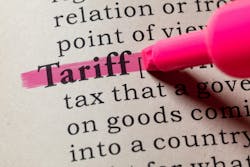US Finalizes Tariff Hikes on More China Green Tech Imports
The United States firmed up tariff hikes Wednesday on more Chinese imports including crucial solar panel components, capping recent efforts by the world's biggest economy to guard its growing green energy sector.
The latest moves announced by the U.S. Trade Representative's office cap a review of tariffs imposed during President-elect Donald Trump's first administration.
Rates for solar wafers and polysilicon are due to double in January to 50%, while those on certain tungsten products will rise from zero to 25%.
"The tariff increases announced today will further blunt the harmful policies and practices by the People's Republic of China," said U.S. Trade Representative Katherine Tai in a statement.
The actions, she added, will complement domestic investments made under outgoing President Joe Biden's administration to boost the United States' clean energy economy.
In May, the White House announced steep tariff increases on Chinese goods, targeting key sectors like electric vehicles, semiconductors, batteries and solar cells.
This drew fiery pushback from Beijing.
Wednesday's announcement furthers earlier efforts.
Hiking tariffs on three additional lines of tungsten products was seen as key to helping U.S. industries including aerospace and defense, according to a notice by the USTR's office.
"Continued reliance on China for tungsten products leaves US supply chains vulnerable and puts US national security at risk," the notice added.
It charged that Chinese imports have been undercutting U.S. domestic production, and that higher levies will make domestic producers more competitive.
Meanwhile, solar wafers and polysilicon are used in solar cell manufacturing.
"While increasing tariffs may result in higher prices initially, the tariffs are necessary to allow domestic producers to compete against China's massive excess capacity, defend recent investments, and encourage more domestic manufacturing," the notice said.
Biden has taken a targeted approach when it comes to tariff hikes on Chinese goods, although he did not roll back increases imposed during Trump's first term either.
At the time, Trump engaged in an escalating tariff war with Beijing.
Trump's return to the White House next month could see temperatures rise again between the world's two biggest economies -- with the president-elect already threatening sweeping tariffs on all imports, and especially high rates on Chinese goods.
All rights reserved ©2024 Agence France-Presse.
About the Author
Agence France-Presse
Copyright Agence France-Presse, 2002-2025. AFP text, photos, graphics and logos shall not be reproduced, published, broadcast, rewritten for broadcast or publication or redistributed directly or indirectly in any medium. AFP shall not be held liable for any delays, inaccuracies, errors or omissions in any AFP content, or for any actions taken in consequence.
